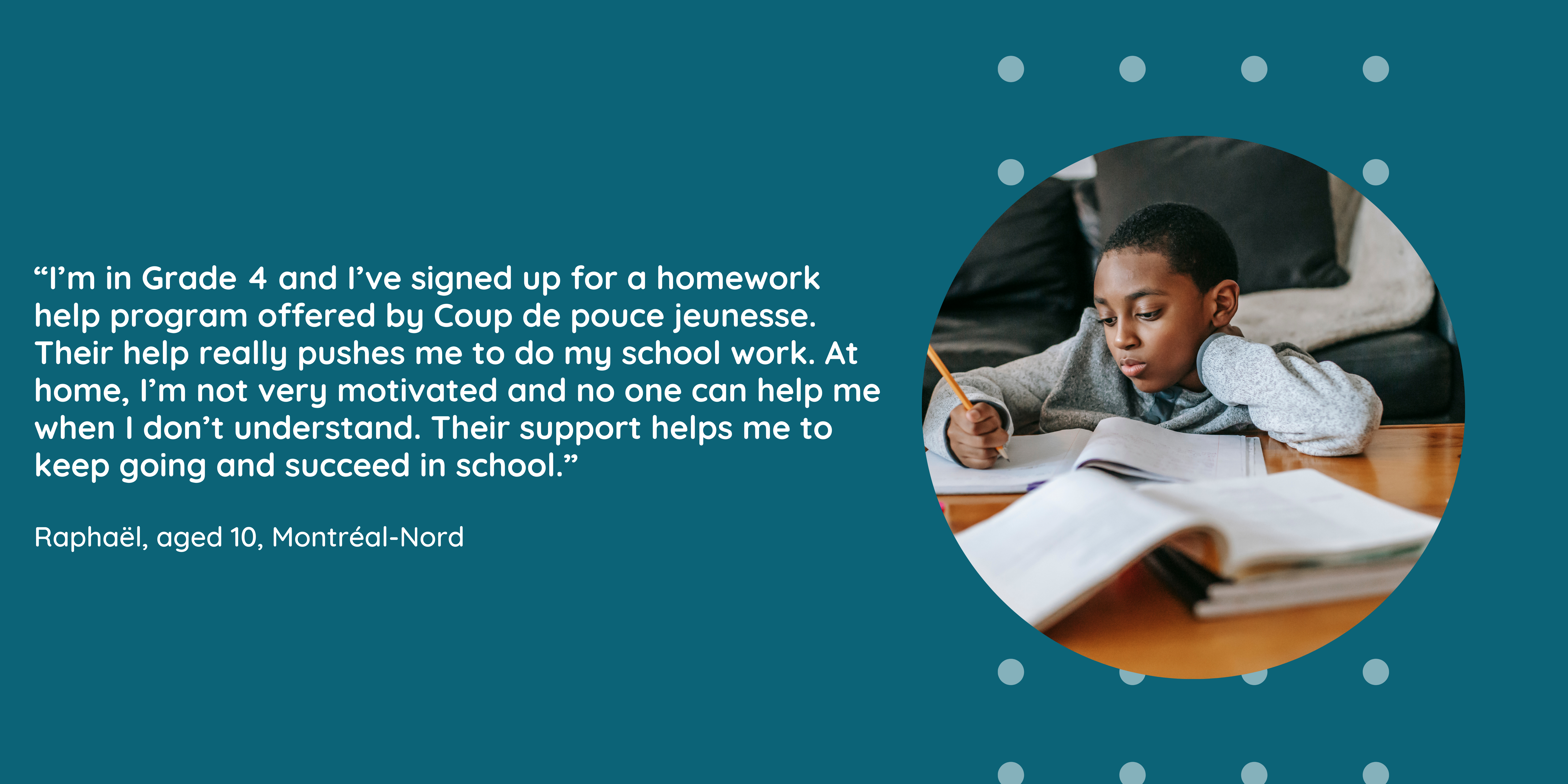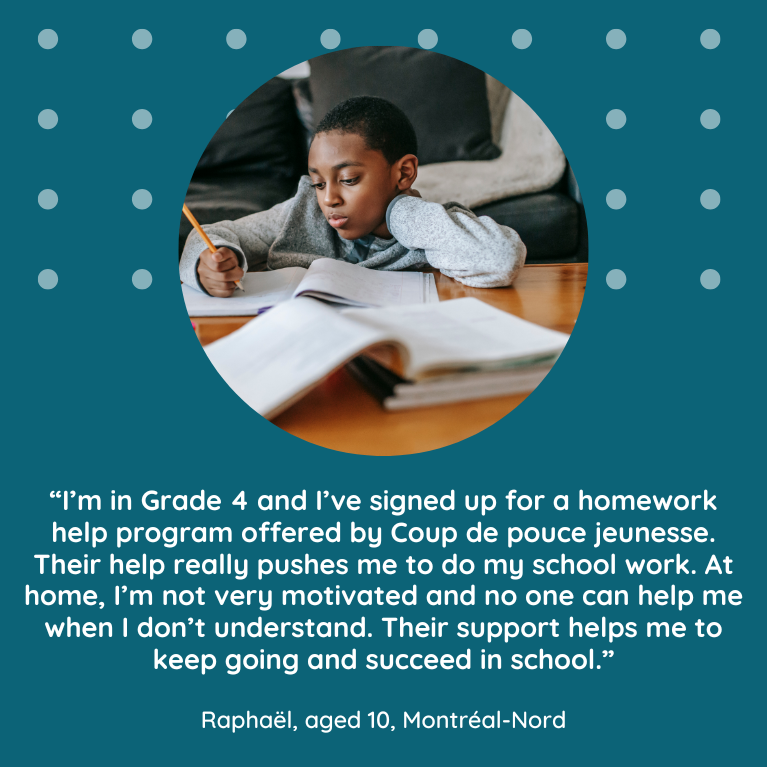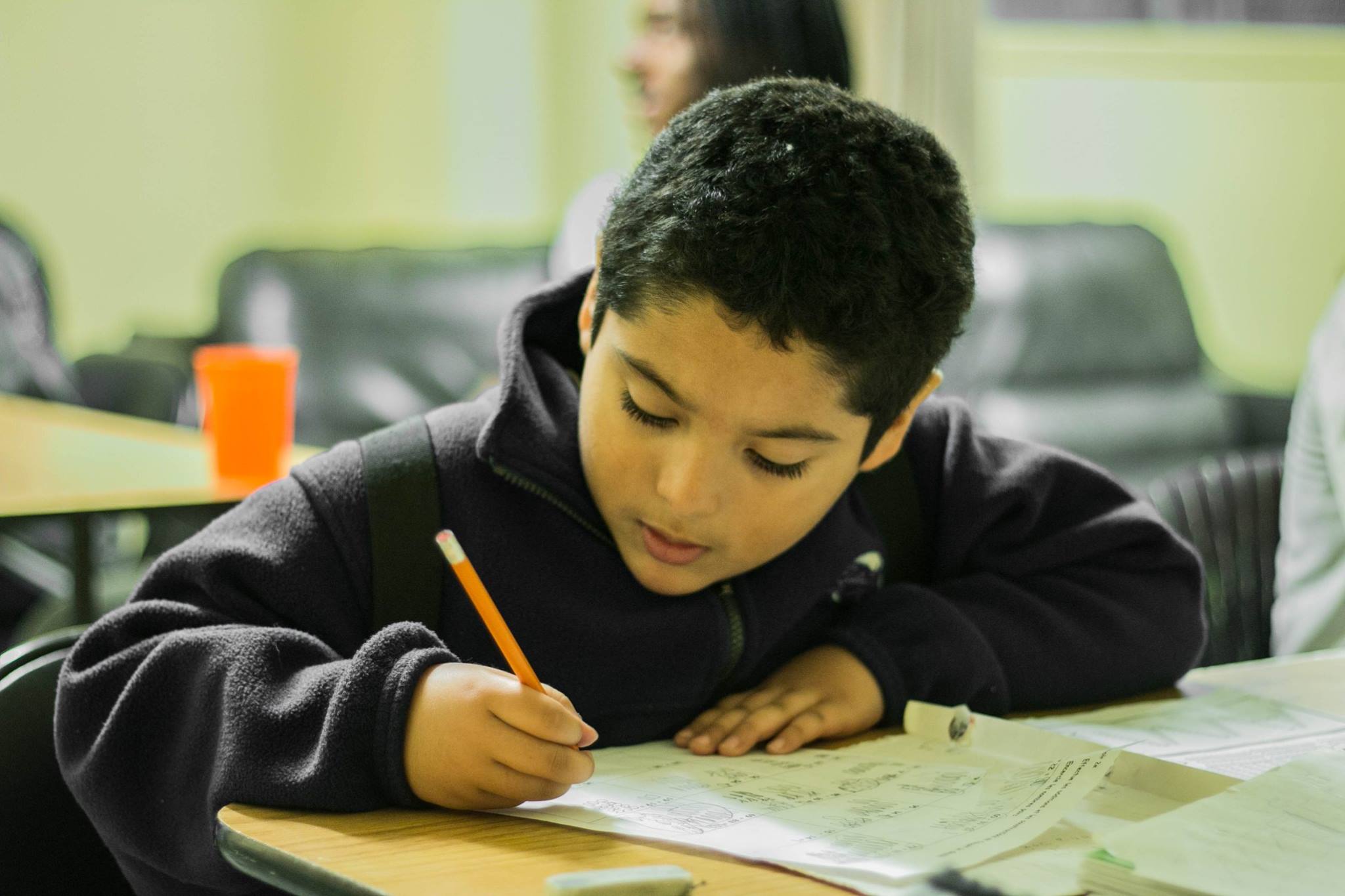Supporting educational and leisure activities
Hope for our youth!
Some 10,000 young people live in housing managed by the Office municipal d’habitation de Montréal (OMHM). There are many community organizations offering them activities, often in the same complexes where they live. The Foundation supports projects offered by these organizations.
TERRITORIAL DISTRIBUTION OF YOUNG PEOPLE AND COMMUNITY ORGANIZATIONS
We invite you to discover the 9 projects supported by our foundation.
- Ville-Émard/Côte-Saint-Paul neighbourhood — HLM des Trinitaires/de La Vérendrye
Project: Actions to support and encourage students
This project contributes to developing the students’ full potential, their initiative, and their sense of responsibility (homework help, follow-up with parents and teachers, writing a book, workshops encouraging citizen participation).
Context
Families living in vulnerable situations. High proportion of socio-economically disadvantaged population, superior to the Montreal average. More than 50% of the families are immigrants and allophone. Many young people have behavioural problems and learning difficulties which have been exacerbated by the pandemic. The situation in many families has deteriorated because of feelings of isolation, students who are lagging behind or difficulty of parents with little schooling, all conditions which greatly affect motivation, perseverance and success at school.Project Description
± 30 kids from 5 to 17 years old, parentsActivities
- Encouraging school perseverance and support from parents with children having learning and behavioural problems;
- Emphasizing the importance of parents being involved in their children’s education and counting on children to be creative.
- Rosemont/Petite – Patrie neighbourhood — HLM Rosemont
Un coup de main vers la réussite
Encouraging success, preventing dropping out, offering favourable conditions for doing school work, encouraging independence, developing good work habits, increasing self-esteem, support from significant people.
Context
High proportion of immigrant families, learning and behavioural problems, little or no support at home, allophones. The workshops given to help students in school are both effective and offer protection.Project Description
± 18 to 20 kids from 5 to 12 years old.The project was recommended by a committee of partners concerned with the academic success of 5 – 12 year olds.
Three types of activities:
- Support workshops: small groups.
- Individual support workshops for children with severe problems.
- Sessions of interactive, literary animation combined with sports activities.
- Lachine borough — HLM Place Lachine
Pedagogical support for students
Context
Isolated low-rent housing neighbourhood, credible organization with roots in the community, particularly disadvantaged neighbourhood, high number of families living below the poverty line, difficult conditions: families’ low incomes, level of schooling very low, unemployment rate on the rise, high percentage of households dependent on government programs, etc. Over half of the families have many children and are led by single parents, mostly women. Over 50 % of adults over 20 years old did not complete their high school education, parents are not well equipped to help their children with their schoolwork, lack of space suitable for concentrating, lack of access to adapted technological tools.Project Description
25 kids from 6 to 12 years old and their parents.Personalized pedagogical support in an environment suited for learning. Offering pedagogical activities, homework help to kids identified by the school and with material suggested by the teachers including artistic activities (arts and crafts, drama), snacks, access to the Internet and to Chromebooks for on-line exercises. Followed by parents and teachers to encourage collaboration and tracking the success of these students.
- Montréal-Nord borough — HLM Place Normandie
Club Réussite
Context
Isolated neighbourhood. Few nearby services. Young residents more likely to drop out of school (factors which accentuate this risk: parents’ low level of schooling, precarious socio-economic situations, single-parent households, disadvantaged neighbourhood). These students have also been greatly affected by the pandemic.Project Description
± 55 kids from 6 to 12 years old, parents, teenagers.Offering homework help and continuing assistance at school based on factors favorable to success. Help with learning good work habits, fun activities. Training for parents to better accompany their children. Availability of spaces for studying equipped with the necessary technological equipment.
- Ahuntsic neighbourhood — HLM André-Grasset, Meunier Tolhurst, Saint-Sulpice
Youth and family intervention – school perseverance
Context :
This project is offered to the population of three OMHM communities. The clientele is complex and many live in financial insecurity. Many of these youth have difficulty at school which is compounded by learning and behavourial problems. The parents do not have the knowledge or ressources to help their children.Project description
± 80 kids from 6 to 12 years old, parentsThe students are recommended by the school for the services offered (homework help, progress meetings). They have access to technological equipment and artistic activities. The project also involves one-on-one help for parents.
- Villeray/Saint-Michel/Parc-Extension borough — HLM Fabre-Marquette, Rousselot, Fabre, Saint-Grégoire, Villeray
Propulsion Avenir Jeunesse Project
Ateliers thématiques à l’intention des jeunes et de leurs parents
Context
There exists among certain young people living in OMHM communities a lack of motivation as well as delinquency and problems resulting in dropping out of school. The local elementary school has observed that teachers do not always have enough time to teach transversal competencies or content related to school and professional orientation. This project concentrates on this aspect of school curriculum which according to the minister of Education plays an essential role in learning, being motivated and succeeding in school.Project Description
±30 to 40 kids between 8 and 9 and 13 and 14 years old, parents.This project aims at discovering transversal competencies and developing the child’s self knowledge as well as knowledge about school and the professional world in general. This is done through various workshops and games. These activities encourage cognitive, social and emotional development and allow the student to be more aware of the importance of school and consequently of persevering at school. The objective is to help the student to know himself better, to identify his personality traits and to be prepared for the challenges faced while at school and later on, in the workforce. The student will able to resolve problems, develop efficient work habits and understand information technology. The potential of these students is optimised; they will learn to cooperate, to ‘ live together ‘ and to communicate appropriately.
Catching up on schoolwork
Background:
The environment targeted by the project has several determinants of povertý and social exclusion. Many young people therefore accumulate several risk factors linked to failure and dropping out of school. The extremely high rate of families with children living on low incomes often adds to language barriers or low parental education, a recent migratory trajectory or single parenthood, to name but a few. These characteristics reflect the vulnerability of the population, and this socio-economic context exposes children to numerous problems that are detrimental to their development and, in the longer term, foster major social and economic inequalities. More specifically, in Saint-Michel, two out of every three students enter first grade with a school readiness problem. Of all the children currently enrolled at La Petite Maison (LPM), the vast majoritý encountering significant academic difficulties, come from large families (3+ children), which explains, in part, the lack of supervision at home. Low proficiency in the French language, autonomy or behavioral problems and delayed academic maturitý are shared difficulties, and more than 50% have learning difficulties. Added to this situation are various economic, functional or cultural factors that further weaken their situation and healthy development.Project:
30 children aged 6 to 12
La Grande Porte would like to enhance its services to children by employing an additional full-time support worker and an animator to offer a quality school support and academic perseverance program to at least 50 vulnerable children through the implementation of good educational practices. The school support program, socio-educational activities and coaching offered are divided into five areas: physical health and well-being, social competence, emotional maturity, cognitive and language development, and general knowledge and communication skills. These take the form of after-school sessions, tailored to the problems encountered and all aimed at healthy overall development.- Hochelaga-Maisonneuve neighbourhood — Habitations Boyce-Viau, Pierre-de-Coubertin
Art'ère Numérik
Background:
The population of Boyce-Viau housing is predominantly allophone and economically precarious. The living environment is marked by delinquency and is isolated within the borough.
With parents who don't always speak French, and who are unavailable to help their children in their school careers, the risk of dropping out of school is high.
Teenagers and young adults also live in an environment marked by delinquency and a high risk of criminal affiliation (initiation into street gangs). The lack of accessible, up-to-date computer equipment is also an obstacle for children, young people and parents. And more now due to the decisive role of digital technology in the school curriculum.Project:
24 young people aged 6 to 18
The creation of a dynamic new space equipped with IT tools will promote digital accessibility for young people and their parents. The existing IT equipment is largely obsolete. Its updating and development will enable the CJBV to offer enhanced homework support workshops, a studio, and parental support for their children's academic progress.- Plateau Mont-Royal neighbourhood — Habitations Laurier
Homework support at de Mentana HLM
Background:
The children who attend PAF come from families experiencing situations that can prove difficult: immigration, society integration, poverty, single parenthood. These families have their own challenges, and yet they demonstrate remarkable adaptability and resilience. Many of the children have difficulties at school, whether learning or behavioral problems. This puts them at greater risk of failure and dropping out of school. Habitations de Mentana also has many single-parent families and families with more than 3 or 4 children. These situations make it more difficult for parents to care for children of different ages and with very different needs.Project:
6 young people aged 6 to 11
The project consists of offering homework help, preceded by a nutritious snack and followed by educational, sports or cultural activities, to the children of HLM De Mentana. The program runs from Monday to Thursday from mid-September to mid-June each year. 18 children aged between 5 and 12 take part in the activities. HLM children are at greater risk of demotivation and academic failure. They are exposed to a number of risk factors: they are immigrants, live in economically disadvantaged families, suffer from social stigmatization, have fewer educational resources (less access to books and knowledge), and so on. Families also have their share of challenges. Families are often overwhelmed by their parents' workloads and the difficulties their children face. What's more, most parents are not fluent in French. Our project responds to the needs of the community: we offer a suitable space and support in learning lessons and doing the children's homework. Activities are supervised by trained instructors and supervised by a manager. The benefits of the project are numerous, for both children and families.
- APPEL DE PROJETS
-
Dans le cadre de sa mission, la Fondation La Clé souhaite financer des organismes communautaires dont la mission et les activités appuient les jeunes des HLM de Montréal dans la poursuite de leurs études et le développement de leur plein potentiel.
Année de l’appel de projets – 2024-2025
Période couverte par le projet – 1er septembre 2024 au 30 juin 2025
Échéancier
APPEL DE PROJETS
Du 1er mars 2024 au 15 avril 2024
COURRIEL D’ACCEPTATION
Juillet 2024
REMISE DE LA SUBVENTION 1ère année (dépôt direct)
Septembre 2024
REMISE DU 1ER RAPPORT DE REDDITION DE COMPTE
Au plus tard le 31 mai 2025
REMISE DE LA SUBVENTION 2ème année (dépôt direct)
Septembre 2025
REMISE DU 2e RAPPORT DE REDDITION DE COMPTE
Au plus tard le 31 mai 2026
REMISE DE LA SUBVENTION 3ème année (dépôt direct)
Septembre 2026
REMISE DU BILAN DU PROJET
Au plus tard le 31 mai 2027
APPEL DE PROJETS
Du 1er mars 2024 au 15 avril 2024
COURRIEL D’ACCEPTATION
Juillet 2024
REMISE DE LA SUBVENTION 1ère année (dépôt direct)
Septembre 2024
REMISE DU 1ER RAPPORT DE REDDITION DE COMPTE
Au plus tard le 31 mai 2025
REMISE DE LA SUBVENTION 2ème année (dépôt direct)
Septembre 2025
REMISE DU 2e RAPPORT DE REDDITION DE COMPTE
Au plus tard le 31 mai 2026
REMISE DE LA SUBVENTION 3ème année (dépôt direct)
Septembre 2026
REMISE DU BILAN DU PROJET
Au plus tard le 31 mai 2027
Critères d’admissibilités
Afin de pouvoir déposer votre candidature, vous devez pouvoir répondre à tous les critères d’admissibilités ci-dessous :
- Être un organisme à but non lucratif privé
- Œuvrer auprès de jeunes âgés entre 6 à 25 ans et de leur famille résidant dans des HLM gérés par l’OMHM
- Être un partenaire de l’OMHM (la participation de locataires de l’OMHM au Conseil d’administration de l’organisme est souhaitable) et/ou travailler principalement avec les jeunes des HLM de Montréal.
- Exister depuis trois ans ou plus
- Être en mesure de démontrer sa capacité de gérer les fonds attribués, de veiller à la planification de ses activités et de leur évaluation
- Répondre aux exigences de l’OMHM en vue d’offrir un environnement sécuritaire (ex. : ratio d’encadrement, assurances)
- Ne pas être relié à une formation religieuse ou politique
Objectifs visés
Le projet développé devra être réalisé dans l’objectif d’appuyer la persévérance scolaire des jeunes par l’un des moyens identifiés ci-dessous :
- Aide aux devoirs
- Promouvoir l’initiative et la créativité
- Accroître le sentiment de fierté et d’estime de soi
Document à joindre à votre demande
- Lettres patentes de votre organisme
- Le rapport annuel de votre organisme
- Vos États financiers de la dernière année et vos prévisions budgétaires pour l’année en cours
- Une résolution de votre conseil d’administration désignant une personne habilitée à signer la présente demande
- Tout autre document pertinent au projet (lettre d’intention, dépliant, revue de presse, photos, etc.)
- Montage financier à remplir (document téléchargeable)
Documents téléchargeables
Suite à l’approbation de votre projet vous devrez fournir :
- Une copie de votre police d’assurance responsabilité civile avec une protection minimale de deux millions de dollars pour les blessures corporelles et les dommages matériels et dans laquelle la Fondation La Clé est désignée comme coassurée.
- Spécimen de chèque pour dépôt direct
- Formulaire d’autorisation de dépôt direct dûment rempli
RENOUVELLEMENT DES SUBVENTIONS AUX ORGANISMES SOUTENUS*
Tous les organismes soutenus doivent soumettre leur reddition de compte annuellement. Vous trouverez ci-dessous les formulaires à compléter en fonction de l’année en cours.
INFORMATIONS GÉNÉRALES :
N.B. Veuillez joindre tous les documents que vous jugez pertinents à l’appui de votre reddition de compte.
- Si vous avez des témoignages de jeunes ou d’intervenants qui pourront servir à promouvoir les activités de financement de la Fondation, veuillez les joindre, avec les autorisations de publication.
- Veuillez joindre des photos d’activités (format numérique) de votre projet, notez qu’un formulaire d’utilisation de photo (à télécharger) devra être signé par les parents des jeunes de moins de 18 ans apparaissant sur la photo.
- Lorsque disponible, pourriez-vous nous faire parvenir votre dernier rapport d’activités incluant les activités financées par la Fondation.
- Téléversez le document de soutien financier, remplissez-le et téléversez-le avec les autres documents.
Par la suite, notre comité interne fera l’analyse de vos résultats et nous communiquerons avec vous au plus tard le 30 septembre pour vous confirmer la reconduction de votre financement et vous faire parvenir le versement s’il y a lieu.




